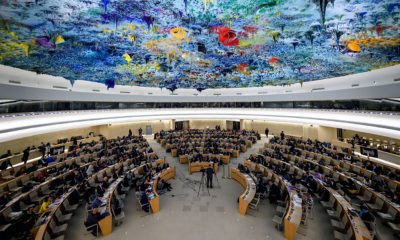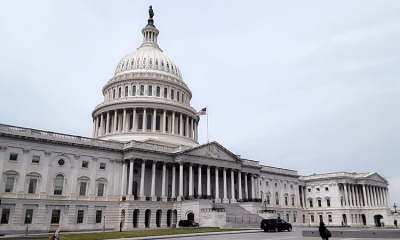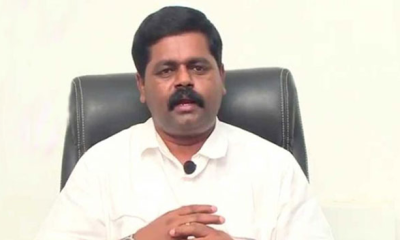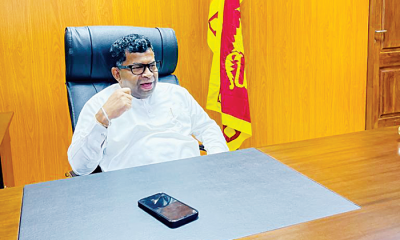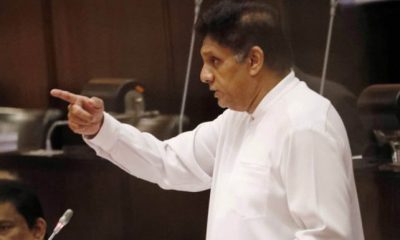News
13A needs buy in from Muslims and Sinhalese to be sustainable – SLMC Deputy Leader
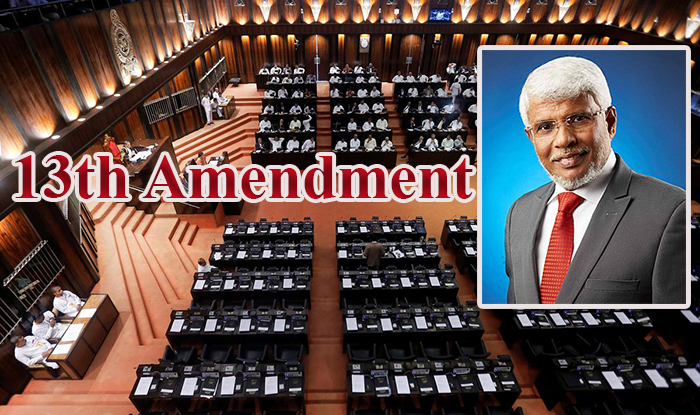
Any solution to the existential ethnic problems of the peoples of the Northern and Eastern Provinces, through the implementation of the 13th Amendment or otherwise, can never be a lasting sustainable solution without the equal and equitable process and participation of the Muslims and Sinhala communities of Sri Lanka, MP Naseer Ahmed, Deputy Leader, Sri Lanka Muslim Congress, said on Thursday (17) in a letter addressed to the President.
Given below is his letter in full:
“We thank you for calling for the views of political parties represented in Parliament on the implementation of the 13th Amendment to the Constitution, enacted on 3rd February 1988. Views were called for to be submitted before 15th August 2023.
“As the only Member of Parliament elected to the present Parliament, on the Sri Lanka Muslim Congress
(SLMC) ticket, being its Deputy Leader (1) and as a Member of Parliament elected by the people of the Batticaloa District in the Eastern Province, I wish to place the under-mentioned matters on behalf of the Muslims of the Eastern Province and the SLMC.
“2) Representations have been made to us by concerned citizens, as to why the President had made a special statement in Parliament on Wednesday 9th August 2023, announcing the steps that the President had planned to take, subject to Parliamentary approval, concerning the 13thAmendment, without (a) the promised discussion with the Muslim (and Sinhala) people of the Northern and Eastern Provinces, and (b) without awaiting the written views of the political parties already called for by the President to be submitted on or before Tuesday, 15th August 2023. However, we are thankful for the President for making a statement in Parliament that he will discuss with the Muslims and Sinhalese parliamentarians of the North East provinces before implementing the 13th Amendment.
“3) In the Eastern Province, Muslims comprise the largest ethno-religious community and in the North and Eastern Provinces Muslim civilians form the largest single community, most of whom were forcibly displaced and a few thousands killed by the LTTE from 1987 onwards. It is well known that the killings and ethnic cleansing of NE Muslims as well as the follow up land grab, of lands and properties belonging to Muslims were executed mainly because of the NE Muslims not supporting the LTTE’s struggle to carve out a separate Tamil nation from and out of the multi ethnic and multi religious Sri Lanka. Any solution to the existential ethnic problems of the peoples of the Northern and Eastern Provinces, through the implementation of the 13th Amendment or otherwise, can never be a lasting sustainable solution without the equal and equitable process and participation of the Muslims and Sinhala communities of Sri Lanka.
“4) Representations have also been made to us that the President in his special statement to Parliament had concluded his references to the 13th Amendment by stating that his objective is to protect the national reconciliation in the country by solving the problems of the Tamils of the Northern and Eastern Provinces. This is being seen as shocking, unacceptable and discriminatory in favour of one community, ignoring the multiple problems of the victimised Muslims, who lost land and lives for not supporting the division of the country. Representations have been made to us, that it is the bounden duty of the President to adopt a non-discriminatory, due process giving the three major communities equal status to achieve a lasting solution to the ethno-religious oriented problems of all the communities in the two Provinces.
” 5) Muslims support the devolution of power to the Northern Province and the Eastern Province but the 13th Amendment in particular has to be amended inter alia
(a) to repeal Article 154A(3) of the Constitution removing the power to merge Provinces,(b) to vest ‘Land and Land Settlement’ powers entirely with the Centre subject to the provisions (i) that all land and land settlement powers will be exercised in any Province only with the concurrence of a 2/3rd majority resolution of the Provincial Council and (ii) subject to non- violation of the ethno-religious population ratio of the Province as per the 1981 census and (c) Law and Order and all Police powers to be exclusively vested only in the Center but the composition of the services personnel responsible for Law and Order in any Province, should reflect the ethno-religious population ratio of the Province as per the 1981 Census.
“6) The government must initiate immediately the resettlement of all Northern Muslims, which the Northern Provincial Council when functioning failed to consider and restore the lands and properties to the Muslims who were driven out during the war, cease all anti-Muslim campaigns in any form and means, reduce the number and the role, except in an extraordinary emergency, of the armed forces in the two Provinces and establish unity, peace and harmony amongst all ethno-religious communities in the country through a genuine consultative process.
In the east large number of Muslims villagers particularly in the periphery area were completely driven out and prevented from returning. These Muslims must be fully resettled in their original villagers.
“7) (a) Provincial Councils must be mandated as their main objectives to achieve the economic development of the province, particularly education, agriculture and health as priorities and urge that the center should constitutionally guarantee the financial allocations to the Provinces are disbursed fully in due time and in proportion to the share of the institutions devolved to each Province. (b) For an effective economic development of the Provinces, at least 85% of all revenue including taxes and rates collected at the provincial and local authority levels must statutorily remain in the respective provincial and local authority treasuries and 2/3rd of which to be allocated by the provincial and local authorities for the development of the respective provincial and local authorities, while the balance 1/3rd to be set apart for backward/under developed areas in the country, subject to auditing by the Auditor General of the centre.
“8) All foreign aid and assistance in any province should be executed with the concurrence of the government and should be executed subject to the Constitutional provisions such as non-discrimination and equal protection of the law, etc.
“9) Amending Articles 4, 5 and 6 of the Constitution, which are well established provisions of the Constitution have not been adequately explained and cannot be supported without legitimate justification.
10) Enacting the controversial proposed Counter Terrorism Law is totally uncalled for as similar laws have never succeeded in containing terrorism as we had seen from the draconian Prevention of Terrorism (Temporary Provisions) Act. Terrorism can be eliminated only through a just, fair and non-discriminatory governance of the country by all those institutions vested with power, including the Courts of Law. The global view is such laws have been heavily abused weaponising them to oppress the minorities leading to greater radicalisation and had damaged reconciliation. These must forthwith cease, if the country is to come out of its economic bankruptcy.”
News
US sports envoys to Lanka to champion youth development

The U.S. Embassy in Colombo welcomed the U.S. Sports Envoys to Sri Lanka, former National Basketball Association (NBA) and Women’s National Basketball Association (WNBA) players Stephen Howard and Astou Ndiaye, from June 8 through 14.
The Public Diplomacy section of the U.S. Embassy said that it would launch a weeklong basketball program intended to harness the unifying power of sports, made possible through collaboration with Foundation of Goodness and IImpact Hoop Lab.
While in Sri Lanka, Howard and Ndiaye, both retired professional basketball players, will conduct a weeklong program, Hoops for Hope: Bridging Borders through Basketball. The Sports Envoys will lead basketball clinics and exhibition matches and engage in leadership sessions in Colombo and Southern Province for youth aged 14-18 from Northern, Uva, Eastern and Western Provinces, offering skills and leadership training both on and off the court. The U.S. Envoys will also share their expertise with the Sri Lanka Basketball Federation, national coaches, and players, furthering the development of basketball in the country. Beyond the clinics, they will collaborate with Sri Lankan schoolchildren to take part in a community service project in the Colombo area.
“We are so proud to welcome Stephen and Astou as our Sports Envoys to Sri Lanka, to build on the strong people-to-people connections between the United States and Sri Lanka,” said U.S. Ambassador Julie Chung. “The lessons that will be shared by our Sports Envoys – communication, teamwork, resilience, inclusion, and conflict resolution – are essential for leadership development, community building, equality, and peace. The U.S. Sports Envoy program is a testament to our belief that sports can be a powerful tool in promoting peace and unity.”
News
Rahuman questions sudden cancellation of leave of CEB employees

SJB Colombo District MP Mujibur Rahuman in parliament demanded to know from the government the reasons for CEB suspending the leave of all its employees until further notice from Thursday.
MP Rahuman said that the CEB has got an acting General Manager anew and the latter yesterday morning issued a circular suspending leave of all CEB employees with immediate effect until further notice.
“We demand that Minister Kanchana Wijesekera should explain this to the House. This circular was issued while this debate on the new Electricity Amendment Bill was pending. There are many who oppose this Bill. The Minister must tell parliament the reason for the urge to cancel the leave of CEB employees,” the MP said.However, Speaker Mahinda Yapa Abeywardena prevented Minister Wijesekera responding to the query and said that the matter raised by MP Rahuman was not relevant.
News
CIPM successfully concludes 8th Annual Symposium

The Chartered Institute of Personnel Management (CIPM) successfully concluded the 8th Annual CIPM Symposium, which took place on 31st May 2024. Themed “Nurturing the Human Element—Redefining HRM in a Rapidly Changing World,” the symposium underscored the pivotal role of human resource management (HRM) in today’s dynamic global landscape. Since its inception in 1959, CIPM has been dedicated to advancing the HR profession through education, professional development, and advocacy, solidifying its position as Sri Lanka’s leading professional body for HRM.
Ken Vijayakumar, the President of the CIPM, graced the occasion as the chief guest. The symposium commenced with the welcome address by the Chairperson, Prof. Arosha Adikaram, followed by the Web Launch of the Symposium Proceedings and Abstract Book by the CIPM President. The event featured distinguished addresses, including a speech by Chief Guest Ken Vijayakumar, President of CIPM, and an address by Guest of Honor Shakthi Ranatunga, Chief Operating Officer of MAS Holdings Pvt. Ltd., Sri Lanka.
The symposium also featured an inspiring keynote address by Prof. Mario Fernando, Professor of Management and Director of the Centre for Cross Cultural Management (CCCM) at the University of Wollongong, Australia.
Vote of Thanks of the inauguration session was delivered by Dr. Dillanjani Weeratunga, Symposium Co-chair.
The symposium served as a comprehensive platform for researchers to present their findings across a wide range of critical topics in HRM. These included Cultural Diversity and Inclusion, Talent Development and Retention, Ethical Leadership and Corporate Social Responsibility, Adapting to Technological Advancements, Mental Health and Well-being at Work, Global Workforce Challenges, Employee Empowerment, and Reskilling and Upskilling.
The plenary session was led by Prof. Wasantha Rajapakse. Certificates were awarded to the best paper presenters during the valedictory session, followed by a vote of thanks delivered by Kamani Perera, Manager of Research and Development.
The annual symposium of CIPM was a truly inclusive event, attracting a diverse audience that spanned undergraduates, graduates, working professionals, research scholars and lecturers. This widespread interest highlights the symposium’s significance in the field of HRM, offering a unique opportunity for everyone to network and learn from scholarly brains.The CIPM International Research Symposium was sponsored by Hambantota International Port, Sri Lanka Institute of Information Technology (SLIIT), E B Creasy & Co. PLC, and Print Xcel Company.


